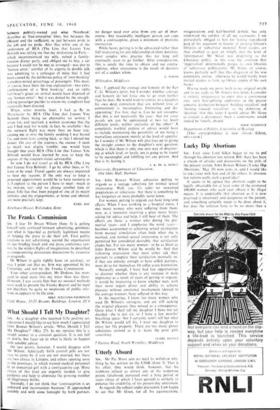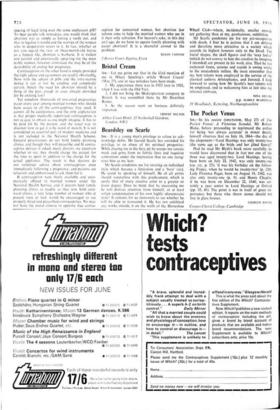Lucky Dip Abortions
Sig.---Ever since Lord Silkin began to try to put through his abortion law reform Bill. there has been a stream of articles and discussions on the evils of the present system. John Rowan Wilson ('Lucky Dip Abortions.' May 20) now joins in. and I would like to take issue with hint and all the others. Is abortion law reform really such a good idea?
It seems to be agreed that abortion ought to be legally obtainable for at least some of the estimated 100.000 women who each year obtain it by illegal means. It is undeniable that abortion as it is now practised is unsavoury and dangerous to the patient, and something certainly needs to be done about it, but does the solution have to he no more than a coating of legal icing over the same unpleasant pill? To hear people talk nowadays, one would think that abortion was as simple as having a tooth out, and that to legalise it would end the worries of the women who in desperation resort to it. In fact, whether or not you regard the two- or three-month-old foetus as a human life, abortion is barbaric. It is violent and painful and emotionally upsetting for the most stable woman. however convinced she may be of the desirability of ending her pregnancy.
Contraception on the other hand is simple provided the right advice and equipment are readily obtainable, Now with the advent of pills and the intra-uterine device it can at last be carefree and completely certain. Surely the need for abortion should be a thing of the past, except in cases already provided for by existing law?
Yet somehow thousands of unwanted pregnancies occur every year among married women who should have access to all the contraceptives they need. It cannot all be carelessness, and the only explanation is that proper medically supervised contraception is not as easy to obtain as one might imagine. It has to be paid for by the patient, and the usual way to discover how to get it is by word of mouth. It is not considered an essential part of modern medicine and is not included in the National Health Scheme. General practitioners do not hold family planning clinics, and though they will prescribe and fit contra- ceptive devices if asked, many doctors are uncertain whether or not they should charge the patient for the time so spent in addition to the charge for the actual appliance. The result is that doctors do not volunteer advice about contraception. even immediately following a pregnancy, and patients are reluctant and embarrassed to ask them for it.
if contraception were freely available and auto- matically offered to married women under the National Health Service, and if doctors held family planning clinics as readily as they now hold ante- natal clinics, a very large number of women who at present trust to luck would be encouraged to use properly fitted and prescribed contraceptives. We may not have the moral climate to approve free contra-
ception for unmarried women, but abortion law reform aims to help the married women who see in it their only salvation. For heaven's sake, in this day anJ age, do we have to equate family planning with easier abortion? It is a shameful answer to the problem.
SUSAN FARROW 2 Bower Court. Epping, Essex



































 Previous page
Previous page